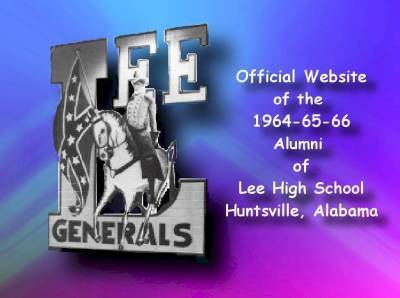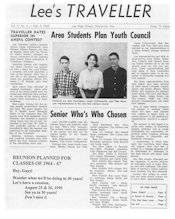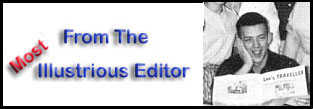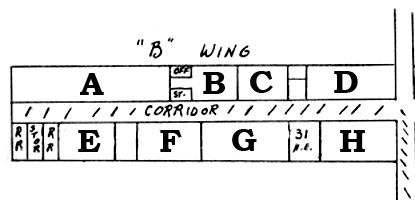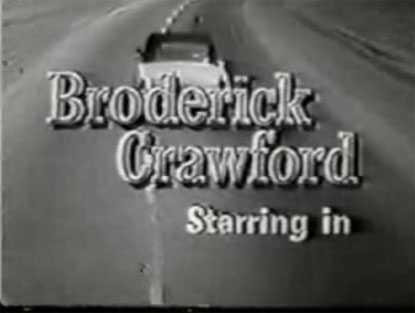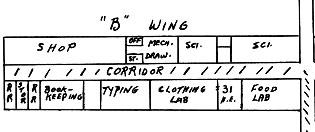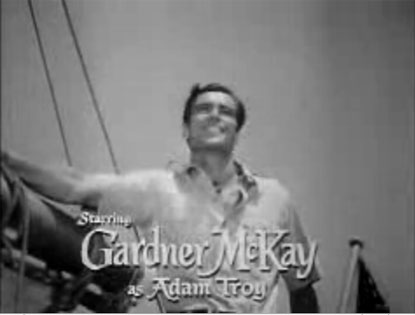TV Back Then
by Tommy Towery
Class of '64
 Below is something I found on the internet that was sent to people who wished to write shows for "Highway Patrol." I think if you read the guidelines, they will speak for themselves about then difference between TV shows we grew up watching and the shows of today.
Below is something I found on the internet that was sent to people who wished to write shows for "Highway Patrol." I think if you read the guidelines, they will speak for themselves about then difference between TV shows we grew up watching and the shows of today.
PERSONAL & CONFIDENTIAL
GENERAL INFORMATION FOR WRITERS ON HIGHWAY PATROL
1. This is basically an action documentary series. We take great care not to imitate any of the other well-known police, detective, sheriff, or district attorney type shows that are on the air.
2. We show the crime quickly or let it have happened. Our crooks are clever or the problem insurmountable and Mathews solves it. We do not like to have criminals caught or the crime solved because thieves fall out. It must be solved by Mathews thinking and using good police work.
3. The tag must wrap up the crime and all the criminals leaving no loose ends. Another very important element in our tag is that after Mathews has apparently solved the crime, some other last minute thing must happen so that our audience will not know the picture is over. An example would be -- two minutes before the end, Mathews solves the crime and holds the criminals at bay -- but a minute and a half from the end they do something which makes it look as though they are going to get away and Mathews' quick thinking and courage stops them. We like to have a last line to the criminal and final going away shot.
Dan Mathews, played by Broderick Crawford, is the head of the Highway Patrol and as such, travels from town to town and office to office. There should always be a crisp clean introduction of Broderick Crawford as Dan Mathews as though the dialog and camera or voice over are saying, "This is Dan Mathews, Head of the Highway Patrol." Dan has no personal life so we don’t talk about wives, children, girl friends nor does he, at any time have any personal relationship with any of the characters. This does not mean, however, that he cannot know his officers and their families. It is very important that he is not written tough. He can fight and enter gun play. He walks very well and we prefer not to have him run unless absolutely necessary. He should never be brought into anything that would be out of his jurisdiction, such as -- investigating a pick pocket, etc.
4. The scripts are written in two acts with the end of the first act having a menace. We use voice over which opens our act and is always in the third person. The opening voice over in act one is in two parts:
The first paragraph is a statement of law enforcement in general; the Highway Patrol in particular. The second paragraph talks about the crime we are about to see. The voice over opening act two is usually one paragraph and is generally a statement of the problem of the crime we are watching. We like out voice overs to use picture words such as "highly charged imagination," etc. The voice over can be, and is used as, a bridge throughout the script but we prefer to think, at this time, of only two pieces of voice over; one at each act opening.
5. We do not use any opticals with the exception of a dissolve indicating a long time lapse, which necessitates bridge scenes. Do not indicate dissolves, fades or other opticals. Because we do not use dissolves in our format it is necessary that the writer keep this in mind and use cut away scenes to get out people from one place to another, but every scene must move the story.
6. We hold our cast units at ten or less. This means one man working two days is two units. Broderick Crawford is not counted in this ten unit group.
7. It is important that your stories are ones that we can do production- wise. We like the scripts set up so that they shoot one day on location and one day on the stage. We prefer to have two days on location rather than a day and a half, which presents certain production problems.
Our scripts should run from 38-41 pages. We work from a premise to a step outline to a screen play. Our scripts have certain policy restrictions:
a. No food or drink. People can eat and can drink but they cannot order food by name such as -- a sandwich. Their ordering must be general such as -- blue Plate Special. Their drink can be something served in a cup, but not named -- can presume to be coffee or tea but not milk or beer or hard liquor of any kind. A soft drink can be ordered, but not named, as in case of children, but this presents a problem in bottle recognition.
b. Smoking. Our people can smoke but we cannot identify the cigarette either by package or length of the cigarette. If a cigarette is offered, it must be taken, A cigarette cannot be stamped out as a dramatic piece of business.
c. Kidnapping. We cannot do kidnapping stories unless the person kidnapped is obviously an adult.
d. Cursing. This of course is prohibited.
e. Words like idiot, crazy, etc. Extreme care must be taken in the use of these common place words or other words or phrases that mean the same, such as "off your rocker".
f. Juvenile Delinquents are forbidden. Any delinquent must be an obvious adult.
8. In the opening of act one be sure to have an exterior scene that allows footage to be shot for title, music, etc. The same applies to the closing of act two. The closing can be an interior scene if absolutely necessary but we definitely prefer an exterior.
9. We have theme music in the series but for purposes of story, do not plan on using it in the body of the picture.
1O. We prefer one day action stories with each scene progressing the story and dialog leading into cutaways.
11. Violence. We want violence and impact but we try to stay away from unnecessary violence and wanton killing unless this is a story point.
12. While Dan Mathews is the head man and makes the final solution,we like our other patrolmen to do something other than be a guy that Mathews talks to.
13. Authenticity. We try at all times for complete authenticity. You should be cautioned that the technical advisor’s word is law, Don't count on a dramatic license, which he may not understand.In our authenticity we use code numbers when talking over the radio between cars and headquarters. When one officer calls another he uses his badge number. Dan Mathews is 2150 so his call would be 2150 to headquarters or 2150 to 3310 and the answer would be headquarters bye, or from 3310 bye.
At the end of the radio conversation the numbers 10-4 are used first as a question meaning,"do you understand?"; and second as an answer,"I understand." "I am going to catch the heavy, 10-4." The answer coming back would be "10-4." One often used number is 10-20, which means "your location." So that a message would be "what is your 10-20?" The answer would be, "My 10-20 is 5th and Main." Another use would be, "I will be at your 10-20 in ten minutes." Various officers are not generally referred to by name over the radio. All Patrol cars have radios, which are used between cars and between, headquarters, rather than telephones. It is all right for officers in a house to call headquarters by telephone and give instructions, but generally speaking they use the car radio. All officers keep headquarters informed at all times such as:- an officer that pulls a suspect car to the side of the road would tell headquarters that he has stopped a suspect car and is now going to investigate. If headquarters does not hear again from the officer they will investigate immediately.
Another commonly used term is AFB which means - "All Points bulletin." AFB's are put out on every suspect and on every new piece of information.
MO means Modus Operandi, or method of operation. This is used in reference to a criminal pattern. The voice at headquarters can be male or female but bear in mind that the voice becomes a cast unit as do radio voices, etc.
The following is a general police term: --
DMV - Department of Motor Vehicles. This is used whenever they are checking license plates and numbers.
14. In the matter of portraying the patrol, our men are all very smart and efficient. We try not to use patrolmen's names nor have the patrolmen, when speaking to Dan Mathews, use his name. So dialog should be designed in such a way that names are not necessary. However; a patrolman introducing a civilian to Mathews would say, "Mr. Jones, this is Mr. Mathews."
They are polite at all times and do not push people around unless the situation calls for it.
l5. Technical advisors are Officer Frank Runyon and Sgt. Mark Benson. They are available for questions but please call us first so that we can either answer your question or tell you which man to call.
____________________________________






